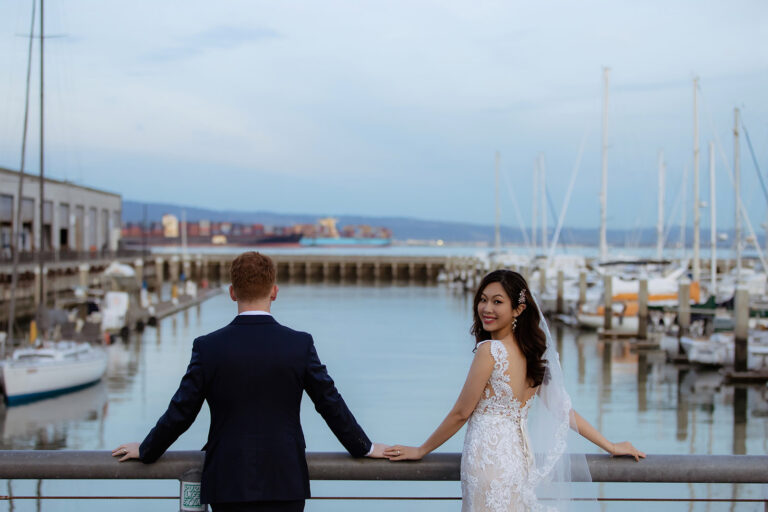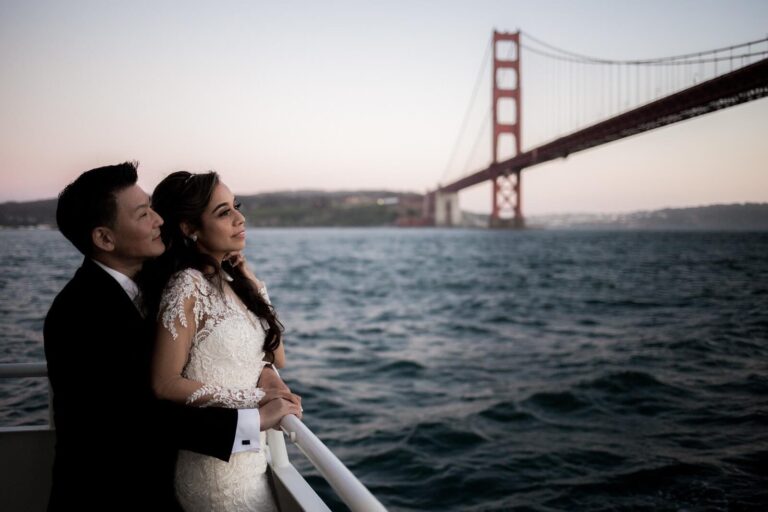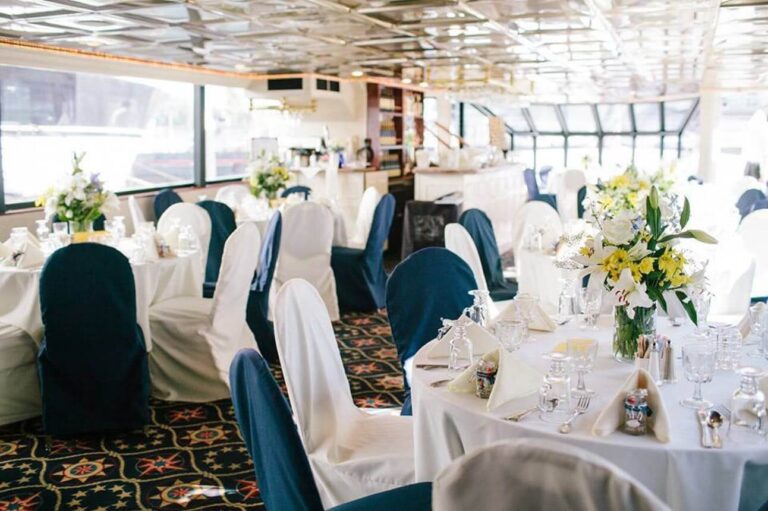State-by-State Marriage License Guide for Yacht Weddings
You might assume getting married on a yacht offers an escape from bureaucratic hassles, but you’ll quickly discover maritime weddings bring their legal complexities. As your vessel crosses from state to territorial to federal waters, different marriage laws come into play. Florida won’t require what California does, and neither matches New York’s regulations. The captain’s authority, your departure port, and your exact location at the moment of “I do” all determine whether your nautical nuptials will legally hold water.
The Maritime Marriage Puzzle: Federal vs. State Jurisdiction
When planning a yacht wedding, you’ll quickly encounter the complex interplay between federal maritime law and state marriage regulations.
This jurisdictional maze determines whose rules apply when you say “I do” on the water.
Federal jurisdiction extends over navigable waters, but states maintain authority over marriage laws.
Once your vessel ventures beyond state territorial waters (typically 3 nautical miles offshore), you’re in federal waters where state marriage requirements may not fully apply.
Your freedom to marry at sea isn’t unlimited – you’ll need to carefully determine which government’s rules govern your ceremony based on your exact location during the vows.
Coastal States and Their Unique Marriage Laws
When planning your yacht wedding, you’ll face different residency requirements depending on which coastal state’s waters you’ll sail in.
Your marriage license needs may change dramatically from California’s relaxed approach to Florida’s stricter regulations.
The port authority where you dock often determines which jurisdiction’s marriage laws apply to your ceremony, so check with them before finalizing your plans.
Residency Impact Varies
Although couples often assume marriage requirements remain consistent across the United States, coastal states maintain markedly different residency requirements for those planning yacht weddings.
You’ll find zero residency requirements in Florida and California, allowing you to arrive and marry immediately.
Maine and Massachusetts, however, impose waiting periods regardless of your residency status.
Connecticut offers a unique advantage by waiving the waiting period for non-residents while requiring it for residents.
These state variations create strategic opportunities.
You might choose your wedding location based on these differences, especially if you’re planning on short notice.
Understanding each coastal state’s specific policies empowers you to navigate bureaucratic hurdles while creating your perfect maritime ceremony.
Port Authority Jurisdiction
Since your yacht wedding crosses into waters regulated by various authorities, you’ll need to understand the port jurisdiction complexities that affect the validity of your marriage license.
Each coastal state maintains port authority oversight of its waters, typically extending three nautical miles from shore. The exact location of your ceremony determines which state’s marriage laws apply.
California requires witnesses, while Florida doesn’t. These maritime jurisdictional nuances matter—cross into federal waters (beyond three miles), and different rules apply.
For maximum freedom, consider international waters (12 miles or more offshore), where captain-officiated ceremonies follow the laws of the vessel’s country of registration rather than any U.S. state regulations.
Territorial Waters and Where Your Vows Count
When planning your yacht wedding, it’s essential to understand the concept of territorial waters, as they define the area where your marriage is legally recognized.
Most coastal states claim jurisdiction within three miles of their shoreline, meaning your ceremony must occur within this boundary for the marriage license to be valid.
You can’t simply sail into international waters and expect your marriage to be legally binding without meeting the requirements of a specific jurisdiction.
Jurisdiction at Sea
Planning a yacht wedding requires understanding maritime jurisdiction, as the legality of your marriage depends on where your vessel is located during the ceremony.
When you’re at sea, your boat falls under the jurisdiction of different legal authorities depending on its distance from shore. Within 12 nautical miles, you’re in territorial waters governed by that state’s laws.
Between 12 and 24 miles, you’re in the contiguous zone where some regulations still apply. Beyond that, you’re in international waters.
These maritime jurisdiction boundaries create legal complexities for your nuptials. You’ll need to coordinate with your captain to guarantee you exchange vows while positioned in waters where your license is valid.
Three-Mile Legal Boundary
Although maritime law recognizes the 12-nautical-mile territorial boundary, the critical three-mile limit creates a considerable distinction for wedding ceremonies at sea.
When you venture beyond this three-mile limit, you’re leaving state jurisdiction and entering federal waters.
This legal definition matters greatly for your ceremony. Within three miles, you’ll need to follow the marriage license requirements of the adjacent state.
Beyond this boundary, different rules apply—often requiring a ship captain registered to perform marriages or necessitating a legal ceremony on land before or after your nautical celebration.
Understanding these boundaries ensures that your maritime vows aren’t only romantic but also legally binding.
Captain’s Authority: Myths and Realities
Many couples believe that ship captains universally possess the legal authority to perform marriages, a common misconception perpetuated by popular media and maritime folklore.
In reality, captain authority varies dramatically by jurisdiction. Most U.S. captains can’t legally marry you unless they’re separately ordained or authorized by state law. This marriage myth leads many couples to discover their yacht ceremony isn’t legally binding.
Before planning your nautical nuptials, you’ll need to verify whether your captain holds legitimate credentials recognized by your state. Some coastal states grant this power, while others require additional qualifications.
Don’t let maritime romance cloud the legal requirements for your freedom to wed at sea.
Offshore Requirements: When International Waters Change Everything
When your yacht wedding ventures into international waters, you’ll encounter a complex web of maritime laws that govern marriage ceremonies.
You need to understand the exact jurisdictional boundaries, as your marriage license requirements change once you cross territorial waters (typically 12 nautical miles from shore).
Your wedding’s legal validity depends entirely on where your vessel is registered and which country’s waters you’re in during the ceremony.
Maritime Laws Vary
Once your yacht sails beyond the territorial waters of your departure port (typically 12 nautical miles from shore), you’ve entered international waters where maritime law takes precedence over national regulations.
This creates fascinating licensing differences between coastal states.
You’ll find that California’s maritime regulations differ substantially from Florida’s, while Washington State’s requirements won’t match Maine’s approach.
These variations stem from how each state interprets the intersection of its jurisdiction with federal and international maritime law.
Understanding these nuances gives you the freedom to choose your departure point strategically, potentially simplifying your wedding paperwork depending on which state’s waters you’re leaving from.
Jurisdictional Boundaries Matter
As your yacht crosses the invisible boundary into international waters, the legal framework governing your marriage ceremony transforms completely.
Coastal state regulations no longer bind you but don’t assume this means regulatory freedom.
Jurisdiction nuances create a complex tapestry of requirements. Your vessel’s flag state typically assumes authority, meaning a Panamanian-registered yacht follows Panamanian marriage laws, not your home state’s.
Legal precedents suggest that marriages performed beyond territorial boundaries require careful documentation upon return.
You’ll need to research whether your home jurisdiction recognizes ceremonies performed outside established boundaries—international waters aren’t lawless, just differently regulated.
Documentation Dilemmas: What to Bring Aboard
Paperwork can easily become the storm cloud over your nautical nuptials if you’re not prepared.
The documentation requirements vary greatly based on where your vessel will be during the ceremony, adding complexity to your free-spirited celebration at sea.
Always bring these necessary paperwork items aboard:
- Original marriage license – photocopies won’t satisfy legal requirements
- Government-issued photo IDs – passports are ideal for international waters
- Witness documentation – some jurisdictions require witness information forms
Don’t let bureaucratic red tape hold your dreams back.
Understanding documentation requirements beforehand guarantees your vessel of love sails smoothly into matrimonial waters without government interference.
Port of Departure vs. Destination: Which Laws Apply?
The legal authority governing your yacht wedding creates one of the most confusing aspects of maritime matrimony.
You’re subject to the laws of your departure port until you reach international waters (typically 12 nautical miles offshore), where different rules apply.
State variances matter greatly. If you depart from California but plan to dock in Oregon for the ceremony, you’ll need to comply with Oregon’s marriage requirements.
Some port regulations even prohibit performing ceremonies while docked without specific permits.
Always confirm which jurisdiction’s laws apply to your specific route.
The destination port’s rules typically prevail for the actual ceremony, regardless of where your journey began.
Historical Evolution of Maritime Marriage Regulations
Maritime marriage regulations have evolved dramatically since the days when ship captains wielded near-absolute authority over ceremonies at sea.
This legal evolution reflects broader shifts in maritime history, striking a balance between freedom and legal recognition.
You’ll find three distinct phases in this transformation:
- Colonial Era (1600s-1800s) – Captains had sovereign-like powers with minimal oversight.
- Regulatory Period (1900s) – Nations established territorial water boundaries and formalized maritime law.
- Modern Era (1950s-Present) – International agreements created clearer jurisdictional frameworks.
Today’s yacht wedding regulations stem from centuries of steering through the tension between freedom at sea and governmental authority over marriage contracts.
Case Studies: Legal Challenges to Yacht Weddings
Despite countless couples successfully tying the knot at sea, yacht weddings have faced significant legal challenges that established essential precedents for maritime ceremonies.
In 2014, California’s “Seaside Matrimony” case redefined jurisdiction boundaries when a couple’s marriage was contested after they exchanged vows three miles offshore. The court eventually upheld their union, setting case precedents for international waters weddings.
Florida saw similar challenges with the “Harper v. State” ruling, where legal interpretations of maritime law clashed with state regulations.
You’ll want to research these cases if you’re planning your yacht wedding, as they’ve shaped how different states now approach offshore ceremonies.
Planning Your Seaworthy Ceremony: State-by-State Compliance Guide
When organizing your yacht wedding, you’ll need to navigate a complex web of state-specific marriage requirements that vary dramatically along America’s coastlines.
Each state maintains its legal definitions of marriage validity and territorial waters.
Your freedom to celebrate shouldn’t be constrained by bureaucracy.
To guarantee your maritime union remains legally binding:
- Research the state requirements where you’ll obtain your license, not just where you’ll dock
- Verify if the captain’s authority extends to the specific waters you’ll traverse
- Document the exact coordinates where vows will be exchanged for legal jurisdiction purposes
Frequently Asked Questions
Are Wedding Ceremonies Aboard Submarines Subject to Different Regulations?
You’ll face unique submarine regulations for underwater ceremonies. Unlike standard weddings, maritime law governs these submerged unions. Check with naval authorities before planning your freedom-inspired submarine wedding to avoid legal complications.
Can I Obtain Marriage License Refunds if Bad Weather Cancels My Yacht Wedding?
You typically can’t get a marriage license refund when bad weather cancels your yacht wedding. These licenses are government fees that remain valid regardless of the ceremony being cancelled. Consider weather insurance for your maritime celebration instead.
How Do Cruise Ship Wedding Regulations Differ From Private Yacht Ceremonies?
Cruise regulations demand you follow maritime laws plus the ship’s policies, while yacht licenses offer more flexibility. You’ll enjoy fewer restrictions with private ceremonies, but both require proper marriage documentation regardless of vessel choice.
What Insurance Requirements Exist Specifically for Maritime Wedding Ceremonies?
You’ll need maritime liability insurance that explicitly covers guests and ceremonies. Your yacht wedding requires extensive insurance coverage, protecting against accidents, weather issues, and potential claims that could arise during your free-spirited maritime celebration.
Do Celebrity Yacht Weddings Receive Special Legal Exemptions or Expedited Processing?
You won’t find legal loopholes just for celebrities. Despite rumors of celebrity privileges, everyone is subject to the same maritime marriage laws. Fame might speed processing through connections, not through special exemptions.
Navigating Legal Waters for Your Yacht Wedding
You’ll need to navigate the complex web of regulations when planning your yacht wedding. Whether you’re in Florida’s relaxed waters or facing California’s stricter requirements, understand which laws apply based on your location. Research your departure port’s rules, verify the captain’s authority, and confirm if your marriage will be legally recognized. With proper planning, your maritime ceremony can be both legally sound and unforgettably romantic.







